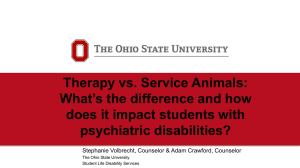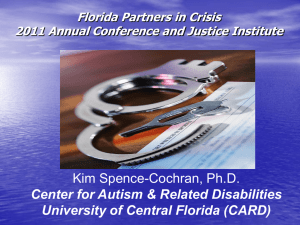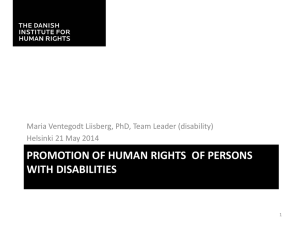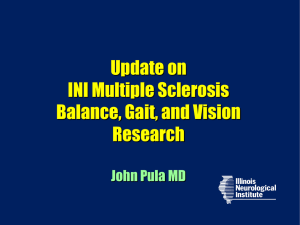Practical Matters Practical Matters Practical Matters 28 The Future??
advertisement
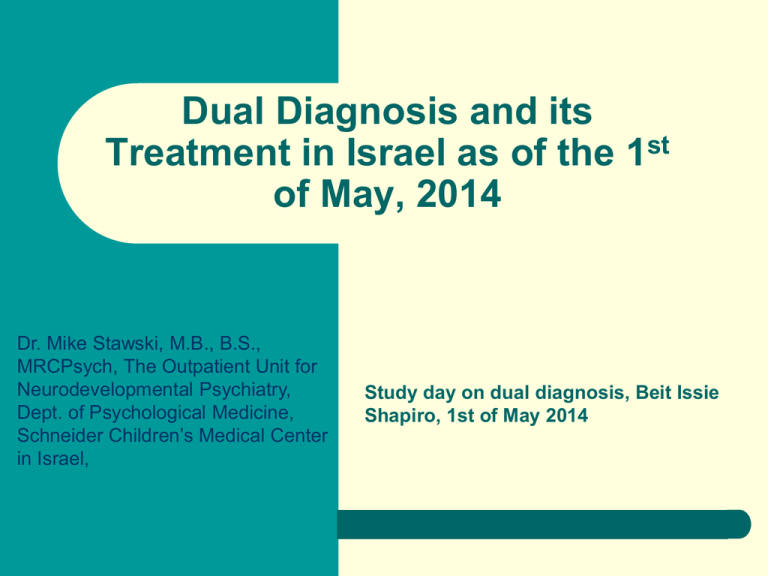
Dual Diagnosis and its Treatment in Israel as of the 1st of May, 2014 Dr. Mike Stawski, M.B., B.S., MRCPsych, The Outpatient Unit for Neurodevelopmental Psychiatry, Dept. of Psychological Medicine, Schneider Children’s Medical Center in Israel, Study day on dual diagnosis, Beit Issie Shapiro, 1st of May 2014 Please Turn Off Your Cell Phone נא לכבות פלאפונים Practical Matters 2 Today’s menu 3 General overview Practical Matters Treatment in Israel Intellectual disability: Definitions 4 – ICD-10 – DSM-5 – Practical Matters The American Association on Intellectual and Developmental Disabilities (AAIDD) – The Israeli definition – The common feature: Delayed, not deviant, development Intellectual disability (III): Prevalence – In European countries 2% mild learning disability, 0.35% severe Matters learning Practical disability* – In Israel about 0.5 % of the general population use services of the “Sherut”** *Roy, M., Clarke, D., Roy A., 2000, (Editors): An introduction to learning disability psychiatry 5 **Nissim, D, R Gorbatov, and M Ben Simhon. "Social Services." In People with intellectual disability, by Sabah Y (Ed.), 441-474. Jerusalem: Ministry Social Affairs, 2011. Intellectual disability (V): Aetiology – 6 “None” (most) Practical Matters – “Genetic” – “Environmental” (Pre-, peri-, postnatal and later Differential Diagnosis of ID 7 Sensory and communication problems Practical Matters Environmental neglect PDD Severe ADHD (especially inattentive type) Schizophrenia Other psychopathology Intellectual disability (XI): Complications Physical Practical Matters 8 Social Psychological Intellectual disability (XIII): Management General medical Practical Matters 9 Psychological Social Background & Concepts IX What are the Psychiatric Aspects? Diagnosis and differential diagnosis of ID Practical Matters 10 Treatment of disturbed people with ID Background & Concepts XI The Epidemiology of Psychiatric Disturbance in ID Reported rates vary significantly from study to study Practical Matters 11 * Point prevalence of psychiatric disturbance is 10% to upwards of 60%* King B.H., State M.W., Shah B., Davanzo P. and Dykens E.: Mental retardation: a review of the past 10 years. Part I. J Am Acad Child Adolesc Psychiatry 1997. 36(12):1656-63. Practical Matters IV "Common" Psychiatric Syndromes in ID 12 PDD Adjustment disorder Schizophrenia Anxiety neuroses Practical Matters Depression Organic brain Mania syndromes Dementia Personality disorders ADHD Isolated symptoms Conduct disorder No diagnosis Practical Matters XIII Treatment: General Issues 13 Assessment assessment assessment! The range of treatments Not just drugs Practical Matters Psychiatry is medicine The patient is the patient Documentation Good quality follow up Reduction of meds Teamwork Contact with families Obstacles to Good Services (I) 14 Atypical presentations. Problems in communication. Practical Matters The problems are often not recognized by caretakers as deviating from “normal” Intellectual disability. If the problems are recognized as representing deviance, they are often not seen as being treatable. Obstacles to Good Services (II) 15 Reluctance to use psychiatric services. Diagnostic overshadowing. Practical Matters Problems that have been correctly identified as representing potentially treatable deviance, may still be incorrectly diagnosed or, if correctly diagnosed, incorrectly treated. The Current Situation in Israel: What There Is and What There Ain’t (Yet!) 16 Closed institutions have a visiting psychiatrist & psychologist Practical Matters Generic mental health outpatient services School psychiatric consultants Private psychiatric consultation Social services There is currently (almost) no dedicated psychiatric outpatient service for people with Intellectual disability in Israel PROBLEMS WITH GENERIC SERVICES IN ISRAEL - THE EVIDENCE Anecdotal evidence Practical Matters Research evidence 1 7 PROBLEMS WITH GENERIC SERVICES IN ISRAELSTAKEHOLDERS’ VIEWS Participants generally not satisfied with current mental healthPractical care forMatters people with intellectual disabilities Sinai A., Werner S. and Stawski, M., 2013: Assessing the need for a specialist service for people with intellectual disabilities and mental health problems living in Israel: A qualitative study. Frontiers in Pediatrics. December, Volume 1, Article 49, 1 1 8 PROBLEMS WITH GENERIC SERVICES IN ISRAEL - PSYCHIATRISTS' VIEWS* 256 psychiatrists (38% response rate) Most (90%) had Practical had limited training in diagnosis and Matters treatment of PWID Between 34% and 72% reported having inadequate knowledge in specific areas *Werner S., Stawski, M., Polakiewicz, Y. & Levav, I. (2013). Psychiatrists’ knowledge, training and attitudes regarding the care of individuals with intellectual disability. Journal of Intellectual Disability Research, 57(8), 774-782. 1 9 The Situation in Other Countries (I) UK, The Netherlands, Finland, Belgium and Norway: Specialist services Practical Matters 20 Sweden and Denmark: “Attempts to cater for psychiatrically disordered people with mental retardation within ordinary mental health services in Sweden and Denmark have proved unsuccessful...” (Day, 1994) The Situation in Other Countries (II) 21 Some of the European countries, North America and Australia are starting to form the specialtyPractical of LD inMatters an informal way UK: Multidisciplinary Community Learning Disability Teams: Psychiatrists, Psychologists, Community Nurses, Speech and Language Therapists, Physios, Occupational therapists, Music, Art and Drama Therapists The NDP Unit in Schneider Children’s Hospital (I) Neurodevelopmental Psychiatry Outpatient Service in Schneider Children’s Medical Center Staff Practical Matters Whom do we see? What do we do with them? – Detailed psychosocial assessment – 22 History Examination Collateral info Detailed feedback The NDP Unit in Schneider Children’s Hospital (II) What do we do with them? (Cont.) – – – – – – 23 Work with parents (mostly behavioural advice) Practical Matters Work with schools Direct treatment Family therapy Medication Long-term, low -intensity follow-up What do we see? The Neurodevelopmental Psychiatry Outpatient Service in Schneider Children’s Medical Center (I) Staff Practical Matters 24 Whom do we see, and where? What do we do with them? AGENTS OF CHANGE Schneider hospital Beit Issie Shapiro Practical Matters Group for the advancement of developmental psychiatry in Israel Neveh Yaakov scandal Psychiatric reform MENTAL HEALTH SERVICES IN ISRAEL- REFORM ! Increased availability of services Matters ExpectationPractical to provide quality services Separation of the provider and the regulator of services The Future?? - I 27 Continuation of the current situation? Provision of psychiatric services by the Practical Matters DMR? Raising of general awareness, knowledge and skills among generic mental health professionals? The Future?? - II 28 The Rotterdam model “Key workers”Practical in everyMatters OPD? Back-up to the generic psychiatrist Specialized psychiatric services A combination of the above The plans of the sick funds DISCUSSION POINTS / QUESTIONS / DILEMMAS What is the minimal and the optimal level of training needed to work in the field? Practical Matters How much training should the non-specialist get? In an ideal world, what is the best means of service delivery? THAT’S ALL, FOLKS! Practical Matters 30
